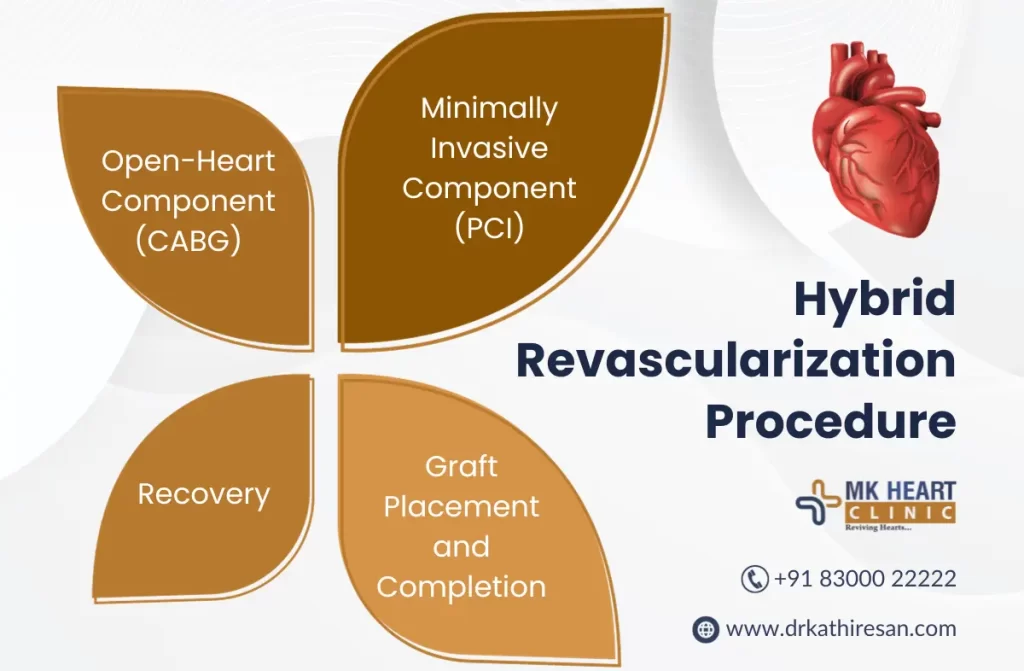Hybrid revascularization in Chennai is a medical procedure that combines minimally invasive techniques and traditional open-heart surgery to treat coronary artery disease. This approach offers patients a tailored treatment plan, potentially reducing surgical trauma and recovery time while improving long-term outcomes. Leading hospitals in Chennai provide this advanced treatment option.
What is Hybrid Revascularization?
Hybrid revascularization in Chennai is a medical procedure that combines two different approaches to treat coronary artery disease, a condition where the blood vessels that supply the heart muscle become narrowed or blocked. In hybrid revascularization, traditional coronary artery bypass grafting (CABG) and percutaneous coronary intervention (PCI), commonly known as angioplasty with stent placement, are used together.
This approach is employed when patients have multiple blockages in their coronary arteries, and the surgeon and interventional cardiologist collaborate to determine the best course of action.
Causes of Hybrid Revascularization
Hybrid revascularization in Chennai is an innovative approach to treating complex coronary artery disease that combines both surgical and percutaneous (catheter-based) techniques. This approach is typically chosen when traditional coronary artery bypass surgery (CABG) is deemed too risky or when it’s essential to address multiple blockages in a less invasive manner.
In hybrid revascularization, one or more coronary artery blockages are treated surgically, often through minimally invasive methods, while others are treated percutaneously using angioplasty and stent placement.
The specific cause for choosing hybrid revascularization can include factors such as the location and severity of blockages, the overall health of the patient, and the desire to minimize the invasiveness of the procedure, leading to quicker recovery times and reduced postoperative complications. By combining the strengths of surgery and catheter-based interventions, hybrid revascularization aims to provide an optimal and tailored treatment approach for patients with complex coronary artery disease.

Who is the Hybrid Revascularization
Dr. M. Kathiresan, a renowned cardiac surgeon, is considered an expert in the field of hybrid revascularization, a surgical approach that combines minimally invasive techniques and traditional open-heart surgery to treat coronary artery disease. He is well-suited to perform hybrid revascularization procedures, as he likely has the necessary skills and experience in both interventional cardiology and cardiac surgery, which are crucial for this approach.
However, it’s essential to consult with your primary care physician or a cardiologist to assess your specific medical condition and determine whether hybrid revascularization is the right treatment for you. If this approach is recommended, Dr. M. Kathiresan or a similarly qualified specialist would be an appropriate choice for your procedure.
Treatment for Hybrid Revascularization in Chennai
Hybrid revascularization in Chennai is a medical approach used to treat complex coronary artery disease, which involves a combination of surgical and interventional (catheter-based) procedures to improve blood flow to the heart. This approach is typically used when traditional coronary artery bypass surgery alone or percutaneous coronary intervention (PCI) alone may not be sufficient.
- Coronary Artery Bypass Surgery (CABG): The surgical component of hybrid revascularization often begins with coronary artery bypass surgery. During this procedure, a cardiothoracic surgeon creates a graft using a healthy blood vessel (usually from the chest or leg) and attaches it to the blocked coronary artery to bypass the blockage, allowing blood to flow freely to the heart muscle.
- Percutaneous Coronary Intervention (PCI): After CABG, the patient may undergo a catheter-based procedure known as PCI. In this step, an interventional cardiologist inserts a catheter into the affected coronary artery and uses techniques such as angioplasty and stent placement to further open and support the blood vessel, optimizing blood flow.
- Medical Management: Following the hybrid revascularization in Chennai’s procedure, patients will typically receive medications to manage their condition. These may include antiplatelet drugs to prevent blood clots, beta-blockers to lower heart rate and blood pressure, and statins to manage cholesterol levels.
- Cardiac Rehabilitation: Patients often benefit from participating in a cardiac rehabilitation program, which includes supervised exercise, lifestyle counseling, and education on heart-healthy habits.
Benefits of Hybrid Revascularization
Hybrid revascularization in Chennai is a medical approach that combines surgical and minimally invasive techniques to treat complex coronary artery disease. The benefits of hybrid revascularization include:
- Tailored Treatment: Hybrid revascularization allows for a customized approach to treating coronary artery disease. Surgeons and interventional cardiologists collaborate to determine the most appropriate combination of surgical bypass and percutaneous coronary intervention (PCI) procedures for individual patients, optimizing the benefits of each technique.
- Minimally Invasive: This approach reduces the invasiveness of traditional open-heart surgery. It involves smaller incisions, leading to quicker recovery times, reduced pain, and a shorter hospital stay compared to full surgical revascularization.
- Reduced Complications: It can lead to fewer complications compared to conventional coronary artery bypass surgery, particularly in high-risk patients who may not be suitable candidates for traditional open-heart procedures.
Risks of Hybrid Revascularization
It is a surgical approach that combines both surgical and minimally invasive procedures to treat coronary artery disease. While it can offer several advantages, it also comes with certain risks.
- Surgical Complications: Any surgical procedure carries inherent risks, such as infection, bleeding, and adverse reactions to anesthesia.
- Myocardial Infarction (Heart Attack): There is a risk of myocardial infarction during or after the procedure, which can occur due to complications or inadequate blood flow to the heart muscle.
- Stroke: The use of minimally invasive techniques, such as stenting, can increase the risk of emboli or plaque dislodgment, which may lead to a stroke.
Conclusion
Hybrid revascularization in Chennai, combining surgical and interventional approaches for treating coronary artery disease, represents a promising and evolving technique. By harnessing the strengths of both procedures, it provides a tailored solution that can improve outcomes, reduce complications, and offer patients a more effective means of managing complex cardiovascular conditions. However, further research and clinical experience are needed to refine and establish its long-term efficacy and safety.


